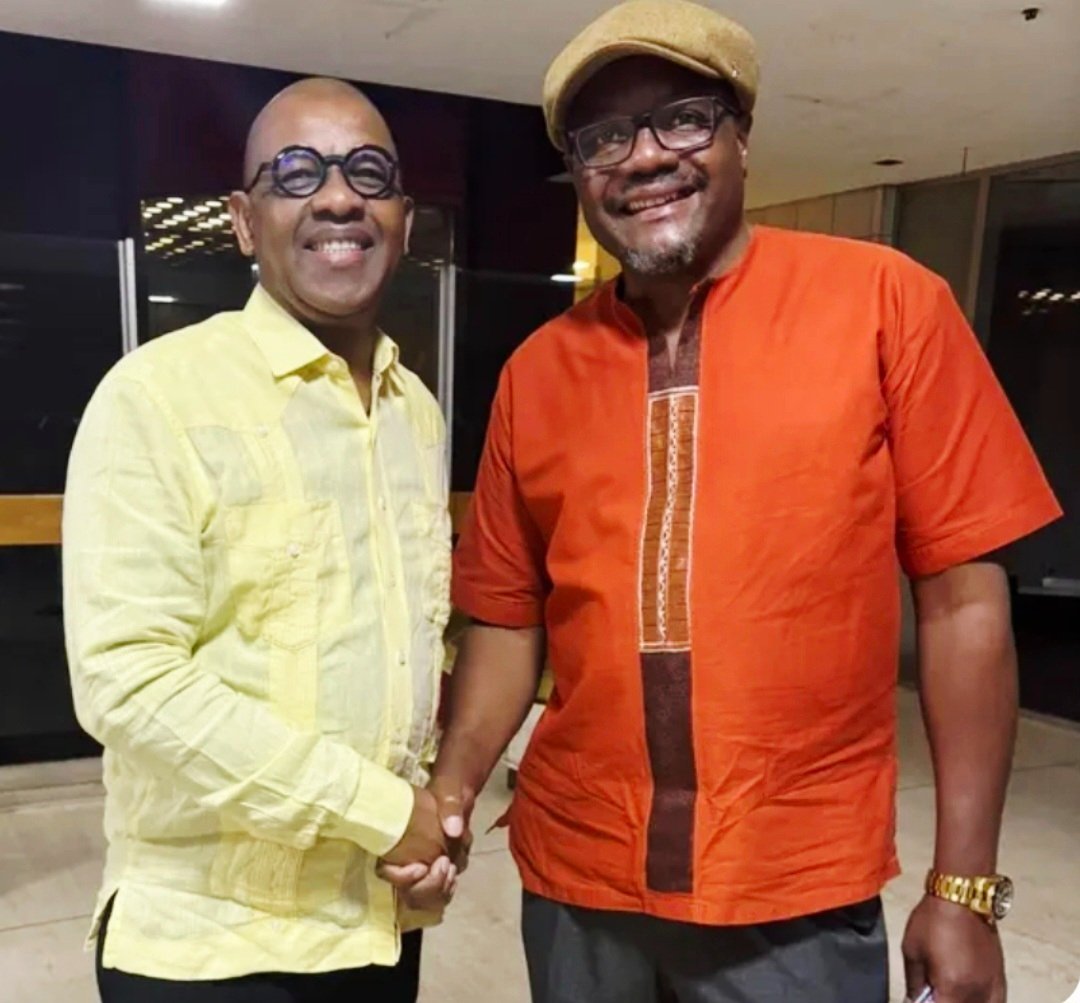
Dali Mpofu, senior MK member, and veteran journalist Hopewell Chin’ono attended Job Sikhala’s biography launch in Johannesburg. Credit Image: X @Hopewell Chin'ono
(The Post News) – Advocate Dali Mpofu, a senior figure in the uMkhonto weSizwe (MK) party linked to former president Jacob Zuma, denounced the widening divisions among African people and urged the continent to embrace growth and unrestricted mobility.
Mpofu delivered his remarks at the Johannesburg launch of Zimbabwean opposition leader Job Sikhala’s biography, “Footprints in the Chains: The Life Story of Job Sikhala.” Zimbabwean journalist Hopewell Chin’ono also addressed the gathering, which drew activists, intellectuals, and political leaders from across the region.
Mozambique’s opposition chief Venâncio Mondlane, invited as guest of honour, joined virtually after Mozambican authorities blocked him from travelling to South Africa.
Mpofu used the platform to stress that the African struggle for unity remains unfinished and that progress requires a deliberate rejection of colonial-era boundaries.
Mpofu Warns Against Colonial Divisions
Mpofu insisted that Africans remain divided by borders they did not create and often cannot explain. He pointed to cultural and historical ties that stretch across countries, such as those linking the people of Matabeleland in Zimbabwe to communities in South Africa.
He reminded the audience that the Ndebele nation’s founder, Mzilikazi, migrated from present-day South Africa to Zimbabwe less than 200 years ago.
By invoking these examples, Mpofu highlighted how arbitrary borders separate people who share language, customs, and ancestry. He traced these divisions back to the Berlin Conference of 1884, where European powers carved up the continent without consulting Africans.
Mpofu argued that those artificial boundaries continue to restrict cooperation, trade, and human interaction.
“These borders did not come from us,” Mpofu told the audience. “Europeans drew them to divide us, and we still live with the consequences.”
Mpofu urged Africans to reject these divisions and to build a continental consciousness rooted in shared history rather than imposed geography.
Economic Struggles Drive Migration
Mpofu argued that Africa’s economic underdevelopment, not hostility to homelands, forces people to move. He said Africans often view migration as survival rather than betrayal, unlike the way it is portrayed in political rhetoric.
He contrasted Africa’s restricted movement with the United States, where citizens freely cross 51 states. He asked why Africans should remain trapped by colonial borders when greater integration could unlock development and opportunity.
“Africans move because poverty pushes them,” Mpofu declared. “If we build stronger economies, our people will not have to leave home in desperation.”
He linked Africa’s brain drain and irregular migration directly to weak economies and poor governance. For him, the solution lies not in building higher walls but in creating conditions that make Africans want to stay while allowing them the freedom to travel across the continent when necessary.
Call for Continental Unity
Mpofu urged Africans to reclaim their identities, languages, and shared pasts as tools for building unity. He emphasised that African people cannot afford to see each other as foreigners when they share so many connections across borders.
He challenged leaders and citizens alike to pursue policies that foster integration, trade, and freedom of movement. He pointed to regional organisations such as the African Union and the Southern African Development Community (SADC) as platforms that can drive change if leaders act with courage and urgency.
“Unity will not come from Europe or America,” Mpofu said firmly. “It must come from Africans who decide to rise above division and act together.”
He warned that without continental unity, Africa will continue to lag behind in development and remain vulnerable to exploitation. But with deliberate efforts to embrace integration, he argued, Africa can unlock its potential and secure prosperity for future generations.
A Message Beyond Borders
Mpofu’s intervention at Sikhala’s book launch went beyond solidarity with Zimbabwe’s embattled opposition. It served as a broader reminder that Africa’s struggle against colonial legacies continues, not only in politics but also in the geography that defines daily life.
By calling on Africans to dismantle psychological and physical borders, Mpofu revived a pan-African vision rooted in shared history and collective progress. His words echoed the aspirations of past leaders who dreamed of an Africa that could move, trade, and grow as one.
For Mpofu, unity is not an abstract ideal but a practical necessity. Without it, Africans will remain fragmented, underdeveloped, and unable to chart their destiny. With it, they can reclaim their continent’s future.



